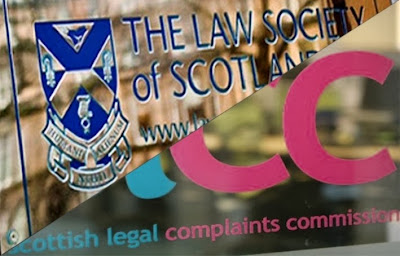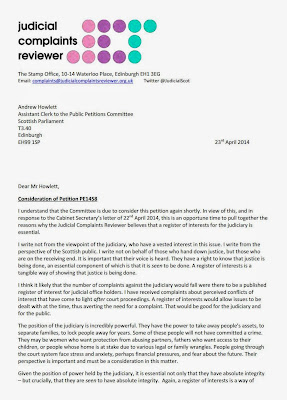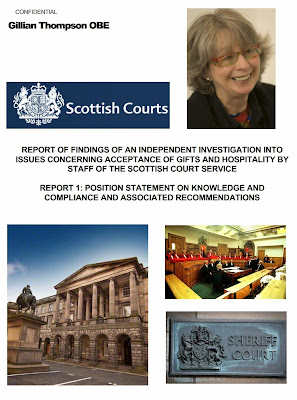 Law change makes it easier for lawyers to look after their own. RECENT Scottish Government backed changes to rules governing how solicitors, advocates and the remainder of the legal profession investigate themselves now make it easier for the ‘independent’ Scottish Legal Complaints Commission (SLCC) to dismiss complaints against rogue lawyers at an earlier stage than is currently allowed, or, if the situation permits, reinstate a complaint after it has already been dismissed.
Law change makes it easier for lawyers to look after their own. RECENT Scottish Government backed changes to rules governing how solicitors, advocates and the remainder of the legal profession investigate themselves now make it easier for the ‘independent’ Scottish Legal Complaints Commission (SLCC) to dismiss complaints against rogue lawyers at an earlier stage than is currently allowed, or, if the situation permits, reinstate a complaint after it has already been dismissed.
Now known as Scottish Legal Complaints Commission (Modification of Duties and Powers) Regulations 2014 the changes also give solicitors involved in conduct complaints a new right to complain about the manner in which the complaint was dealt with by the relevant professional organisation.
The controversial change - allowing lawyers to complain about complaints, may inevitably lead to dodgy lawyers using this procedure as a tactic to avoid the already meagre disciplinary measures handed down by the Law Society of Scotland and the Scottish Solicitors Discipline Tribunal (SSDT).
Earlier this year, the SSDT was shamed earlier this year in Lawyers Behaving Badly - a BBC Scotland investigation which revealed how “dishonest” lawyers escape being struck off in Scotland while in England & Wales, such conduct would result in a striking off.
Another change to the rules governing the Scottish Legal Complaints Commission effectively creates a quango within a quango - requiring the SLCC to set up an ‘independent’ panel to advise it on consumer and equality issues.
While the ‘independent’ advisory panel is more likely to be comprised of lawyers vested interests like the SLCC itself, MSPs were told it is is also to include representatives from consumer and equalities organisations. The panel's remit will be to make recommendations to the Commission for improvements in practice and procedures; to make suggestions of topics for research connected to consumers; and to express views on other matters as requested.
Attending with the Justice Secretary, Roderick Campbell, a member of the Faculty of Advocates said of the advisory panel: “Putting into statute the independent advisory panel is a way forward and I am pleased that it will include representatives of consumer and equalities organisations. That ought to improve substantially how the commission functions, if it takes on board the panel's comments.”
The overly pro-lawyer moves, are a result of discussions between a group consisting of the Law Society of Scotland, the Scottish Legal Complaints Commission, the Faculty of Advocates, the Association of Commercial Attorneys, the Legal Defence Union, the Scottish Solicitors Discipline Tribunal, Citizens Advice Scotland, Which? and the centre for professional legal studies at the University of Strathclyde law school were backed by Justice Secretary Kenny MacAskill, who attended the Justice Committee on 5 August 2014 to give evidence on the proposed changes.
 Rules change will benefit consumers little. The Scottish Legal Complaints Commission (Modification of Duties and Powers) Regulations 2014, were laid under section 41 of the Legal Profession and Legal Aid (Scotland) Act 2007, passed by the Scottish Parliament eight years ago in what has now become a flawed attempt to clean up the law on how lawyers deal with complaints against their colleagues.
Rules change will benefit consumers little. The Scottish Legal Complaints Commission (Modification of Duties and Powers) Regulations 2014, were laid under section 41 of the Legal Profession and Legal Aid (Scotland) Act 2007, passed by the Scottish Parliament eight years ago in what has now become a flawed attempt to clean up the law on how lawyers deal with complaints against their colleagues.
The instrument will make amendments to the Legal Profession and Legal Aid (Scotland) Act 2007 to adjust the duties and powers of the Scottish Legal Complaints Commission (SLCC) and to impose new duties and new powers on it. These include--
-
giving the SLCC the ability to revisit the eligibility of the complaint during the investigation phase;
-
providing for a more flexible order of consideration of aspects of complaints;
-
giving the SLCC the ability to discontinue the investigation of a complaint and, should it wish, reinstate a complaint where it has discontinued an investigation;
-
providing practitioners about whom a conduct complaint has been made with the power to complain to the SLCC if they feel that the conduct complaint has been poorly handled by the relevant professional organisation;
-
providing new powers for dealing with recommendations in reports on handling complaints;
-
providing for handling complaints to be reinstated;
-
placing an obligation on the SLCC to set up and consult an independent panel.
During the short debate, in which the amendments to legislation was passed by the Justice Committee and is a statutory instrument, Mr MacAskill claimed he had not heard any suggestion the heavily pro-lawyer, anti-client Scottish Legal Complaints Commission was “not working reasonably well and smoothly.”
Justice Committee Scottish Parliament 5th August 2014 SLCC Rules change
The short debate at the Scottish Parliament on the Scottish Legal Complaints Commission (Modification of Duties and Powers) Regulations 2014 :
The Convener: If I have members' attention, I will move on to agenda item 2, which is consideration of an affirmative instrument. The draft regulations amend and add to the duties and powers of the Scottish Legal Complaints Commission with the aim of improving the complaints process.
The cabinet secretary has, of course, stayed with us, and I welcome from the Scottish Government Denise Swanson, head of the access to justice unit, and Alastair Smith, from the legal services directorate. The cabinet secretary will give evidence in advance of the debate on the regulations. I understand that he wishes to make a brief opening statement.
Kenny MacAskill: Thank you, convener. I am happy to be here to assist the committee in its consideration of the draft Scottish Legal Complaints Commission (Modification of Duties and Powers) Regulations 2014.
The Law Society of Scotland and the Scottish Legal Complaints Commission previously contacted the Minister for Community Safety and Legal Affairs and the Justice Committee to raise concerns about certain tactical aspects of the Legal Profession and Legal Aid (Scotland) Act 2007. The society and the commission agreed to form a working group with other stakeholders, the aim of which was to suggest changes to the legislation to improve the complaints process, which would benefit both the public and the profession. The group consisted of the Law Society, the Scottish Legal Complaints Commission, the Faculty of Advocates, the Association of Commercial Attorneys, the Legal Defence Union, the Scottish Solicitors Discipline Tribunal, Citizens Advice Scotland, Which? and the centre for professional legal studies at the University of Strathclyde law school.
The amending regulations are a direct result of the working group's findings. They will significantly assist in making the legislation a more effective framework for dealing with legal complaints in Scotland, which is in keeping with the Scottish Government's national outcome:
"Our public services are high quality, continually improving, efficient and responsive to local people's needs."
The regulations will rearrange the order in which the SLCC considers the various aspects of a complaint, to improve efficiency and better reflect current practice. They will give the SLCC the power to discontinue and reinstate service complaints and will give legal practitioners the right to complain about the handling of a complaint by a professional body. They will also require the SLCC to set up an independent panel to advise it on consumer and equality issues.
I hope that that is useful to the committee. I am happy to take questions.
The Convener: It all seems like common sense to me.
Margaret Mitchell: I thank the cabinet secretary for that opening statement. To what extent does the Scottish Government monitor the operation of the commission?
Denise Swanson (Scottish Government): The SLCC lays an annual report before Parliament. It is a non-departmental public body for which my unit has sponsorship responsibility. We work closely with the SLCC, including on its consultation on budget proposals. It is an unusual non-departmental public body in that it is funded not by the Scottish Government but by a levy on the profession. There is a certain amount of accountability to the profession regarding the way that the commission operates. We work very closely with it on improvements to and efficiency in its operations.
Margaret Mitchell: I am aware that ministers appoint members of the board. Given that the changes, which are all very sensible and should improve the complaints system, have come from stakeholders, and given that the commission came into being in 2008, is it not time for some post- legislative scrutiny of how the commission is operating and a more in-depth look at its performance and how it could be improved?
Kenny MacAskill: I am happy to consider any suggestions that Ms Mitchell or, indeed, the committee may have, but it seems that we have the appropriate balance. As Denise Swanson said, the commission is a non-departmental public body. We appoint the commission and there is a level of scrutiny there, but we have to have trust and faith in those who are appointed, and we do. Equally, it is quite clear that the levy, which is unusual, if not necessarily unique, ensures that there is a great deal of scrutiny by bodies that represent individual members of the profession.
I am happy to take on board any suggestions, but it seems that the commission, together with those stakeholders, has been working reasonably well. It has recognised that there have been challenges and difficulties, and it has got itself together and worked out what changes are needed. We are here as an Administration to support it, although we are open to suggestions.
Margaret Mitchell: I understand that the SLCC is funded by a levy on stakeholders—people who may be the subject of complaints—so I suppose that I am suggesting that we should ensure that there is more independent scrutiny.
Kenny MacAskill: Again, I say that I am open to suggestions about the level of scrutiny that you want. I have had no suggestion that the organisation is not working reasonably well and smoothly. Clearly, the Government has oversight and responsibility regarding the commission, as it does with any NDPB. It seems that some tweaks have been made and some challenges have been met. We are discussing and engaging with stakeholders.
My deputy and I meet the Faculty of Advocates and the Law Society regularly. Unless matters such as malfeasance were suggested, I do not see why the Government would wish to intervene in a body that appears to be liaising well and operating reasonably smoothly. However, we are always open to suggestions.
Margaret Mitchell: The measures in the regulations are good but, given their number, it would be good to have wider debate and parliamentary scrutiny. We in the Scottish Parliament are notoriously bad at doing post- legislative scrutiny.
Kenny MacAskill: That is a matter for the committee or perhaps for Opposition parties in considering Opposition days. One reason why many aspects have been referred to is that the field is complicated. I welcome the fact that the measures have been discussed and taken on board not only by those who would normally expect to be represented, such as the Law Society and the Faculty of Advocates, but by bodies that interact with the public, such as Citizens Advice Scotland and Which? The issue that you raise is for Parliament rather than the Government.
The Convener: I do not want to give evidence, but am I right in saying that an arm of the Law Society used to deal with complaints? That was not satisfactory. We have now moved to the Scottish Legal Complaints Commission. Does the cabinet secretary agree that the independent advisory panel will be important, as it will look at how the commission operates?
Kenny MacAskill: The basis for establishing the SLCC was public concern, which was transmitted across political parties, as the convener said. Such aspects could not and should not be dealt with by professional bodies regulating themselves.
Denise Swanson: It might help to note that, in the past two to three years, the SLCC has reported an improvement in the efficiency of its complaints handling. There was a bit of a backlog, which has been resolved. In the budget proposals that were recently consulted on, the SLCC reduced the levy. It is reporting on improvements in processes and in the time that it takes to process complaints.
Margaret Mitchell: Are you confident that the enforcement of recommendations is working well?
Denise Swanson: Yes. The number of cases that are taken to court for enforcement is reducing.
Roderick Campbell: I refer to my registered interest as a member of the Faculty of Advocates. Putting into statute the independent advisory panel is a way forward and I am pleased that it will include representatives of consumer and equalities organisations. That ought to improve substantially how the commission functions, if it takes on board the panel's comments.
The Convener: I welcome the flexibility that is being built in, but I am surprised that it has taken a wee while to get that. It seems like common sense to have the ability to revisit eligibility questions and rearrange the order of consideration and to have the power to discontinue and reinstate service complaints. They all seem like measures to manage cases that should have been available from the start, so I very much welcome them.
Consultation packs were sent to a range of people. Were they all happy? Were the consultees—particularly the consumer organisations Citizens Advice Scotland, Which? and the Office of Fair Trading—content with the amendments to existing practices?
Denise Swanson: Yes. Those organisations were part of the group that worked on the proposals. The group's remit was to agree which improvements could be delivered through practice change, which would require primary legislation and which would require subordinate legislation. The group agreed on the position.
The one outstanding issue concerns appeals going to the Court of Session. That element requires primary legislative change, so the group accepted that it must remain as it is at the moment.
The Convener: Do the rest of the proposed amendments have agreement across the spectrum?
Denise Swanson: Yes.
The Convener: That is fine.
Members have no more questions, so we will move on to item 3, which is the formal debate on the motion on the regulations. I invite the cabinet secretary to move motion S4M-10634. Motion moved,
That the Justice Committee recommends that the Scottish Legal Complaints Commission (Modification of Duties and Powers) Regulations 2014 [draft] be approved.—[Kenny MacAskill.]
Motion agreed to.
The Convener: As members are aware, we are required to report on all affirmative instruments. Are members content to delegate authority to me to sign off the report? Members indicated agreement.
The overtly pro-lawyer changes to the SLCC’s rules, dubbed by critics as more “window dressing” come after Justice Secretary MacAskill earlier this year refused to give more powers to the Judicial Complaints Reviewer to hold dodgy Scottish judges to account, some of whom were revealed to have criminal records, tax dodging investments and shareholdings in businesses directly connected with the courts.
Although the legal profession claim the Scottish Legal Complaints Commission is independent and funded by lawyers, in reality, the SLCC is paid for by a levy from lawyers who in turn recoup it many times over from unsuspecting clients. In short – if, as clients, you have paid legal fees since 2008, you have probably paid your solicitor’s SLCC complaints levy many times over.
Last year, a media investigation revealed lawyers secret links with ‘independent’ regulator, showing the Scottish Legal Complaints Commission is actually run by former Law Society of Scotland employees, lawyers, and other vested interests from the legal profession.
 Paid for by you – legal regulator is no guarantee of justice for wronged clients. WHENEVER someone asks the question – who exactly pays for the Scottish Legal Complaints Commission (SLCC) - the ‘independent’ regulator of solicitors in Scotland, from judges to Justice Secretary, from lawyers to advocates, and even the SLCC itself, the answer is always – the ‘independent’ regulator is funded by a levy paid by lawyers.
Paid for by you – legal regulator is no guarantee of justice for wronged clients. WHENEVER someone asks the question – who exactly pays for the Scottish Legal Complaints Commission (SLCC) - the ‘independent’ regulator of solicitors in Scotland, from judges to Justice Secretary, from lawyers to advocates, and even the SLCC itself, the answer is always – the ‘independent’ regulator is funded by a levy paid by lawyers. 










